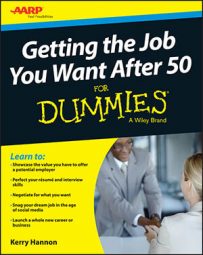Copyright © 2015 AARP. All rights reserved.
If you’ve decided to change careers, fly solo as a freelancer, or start your own business after 50, you should seriously consider finding a mentor to guide you, someone who’s been there and done that. Almost universally, workers who have made a successful transition to new work after age 50 had at least one person they could turn to when the ground got shaky.
The person inevitably was someone experienced with the ins and outs of the new line of work. A mentor or sponsor can play several roles, from teaching you the ropes to encouraging you and even recommending you to potential employers or customers.
Be prepared to nurture your mentoring relationship over an extended period of time. A good mentoring relationship grows organically and gradually.
Finding a mentor
Finding an able and willing unpaid advisor takes time and patience. First, make a list of the people in your network who you deem able to provide you with the guidance you need, individuals who have knowledge and experience in the line of work you’re interested in doing and are likely to be wise and patient guides. Think Obi-Wan Kenobi, Luke Skywalker’s wise and patient mentor.
After settling on the person you want to serve as your mentor, ask the person for some specific advice about an issue or problem you’re facing. Ease into the relationship with baby steps. You don’t even need to mention the word “mentor,” but if you’re looking for a more formal mentor-mentee relationship, you can eventually broach that subject with an invitation.
At some point, you’ll want to schedule regular meetings, even if only to have a cup of coffee and touch base on how things are going. Mentorships and sponsorships frequently turn into mutually beneficial friendships. The main reason most mentors and sponsors say they take the time to counsel and help is the elusive gratification they get in paying it forward.
If you decide to look for a mentor or sponsor, be clear about your goals for the relationship. Write them down to help you focus on what you hope to achieve. You may have a certain business task at hand, something as simple as wanting someone to give you advice on how to spruce up your image in the workplace, such as proper attire.
Or it could be someone who can tell you which business courses are most worthwhile or which people at a certain organization to approach about getting a job there. Or perhaps you’re looking for someone who can help you learn the ropes of a new business area or skill.
Considering reverse mentoring
Mentoring is the buzzy concept in the work world these days. And for people over 50, at least, the latest twist is reverse mentoring, partnering with someone younger (typically of the same sex) to learn from each other. Reverse mentoring is especially effective when the mentor and mentee complement one another, for example, when the younger person is more tech savvy and the older person knows the business.
Many millennials have a contagious energy and entrepreneurial attitude. Their drive and that passion to achieve success can be a great motivator.
Navigating the high tech world or social media apps and more can be frustrating. AARP sponsors a free program called Mentor Up in communities around the country, which connects people 50 and older with someone younger who can help them learn the ropes.

